This might be my tardiest monthly book post yet; I’ve been so distracted and busy with preparations for our upcoming trip to visit our ex-pat crew. Travelling is much more complicated since my last trip to Europe (even if that took place in the context of gilets jaunes and a National General Strike!), almost two years ago. But I think we have all the documents downloaded and printed and organized in a plastic folder, all the screenshots and QR codes stored correctly on our phones. Trains and hotels (and even tickets for an exhibition) have been booked, plans made for a few outings with “the kids.” Weather patterns and forecasts have been studied and (small) cases packed accordingly.
One travel problem that had to be solved was one that readers will appreciate — both of us regularly borrow e-books from our library through a platform called OverDrive and we read these on our iPadMinis . . . but those iPadMinis are almost nine years old. They’ve been defying all the logic of “planned obsolescence” . . . until now. The tablets still work fine, but their operating systems can’t be upgraded to accommodate changes in OverDrive and two weeks ago, our e-borrowing system ground to a frustrating halt. So I’ve bought a new Kobo reader, lightweight and easy to use; Paul doesn’t like being forced into purchases and has decided to download his library books onto his laptop and read them there. Seems cumbersome to me, and I suspect battery life is going to frustrate him (especially since his device will be competing for Travel Adaptor time in our hotel room), but he’s committed. I’ll let you know how it goes. Paper books aren’t a viable option for carry-on-only weight restrictions and greedy readers who need their books in multiples. . . .You know what I mean!
So I’ve been downloading a few books for plane and train reading, and those titles will be included in my October and November book posts — who knows how long it will take me to post those, at this rate?! Meanwhile, though, here’s a stack with most of my September reading. . .
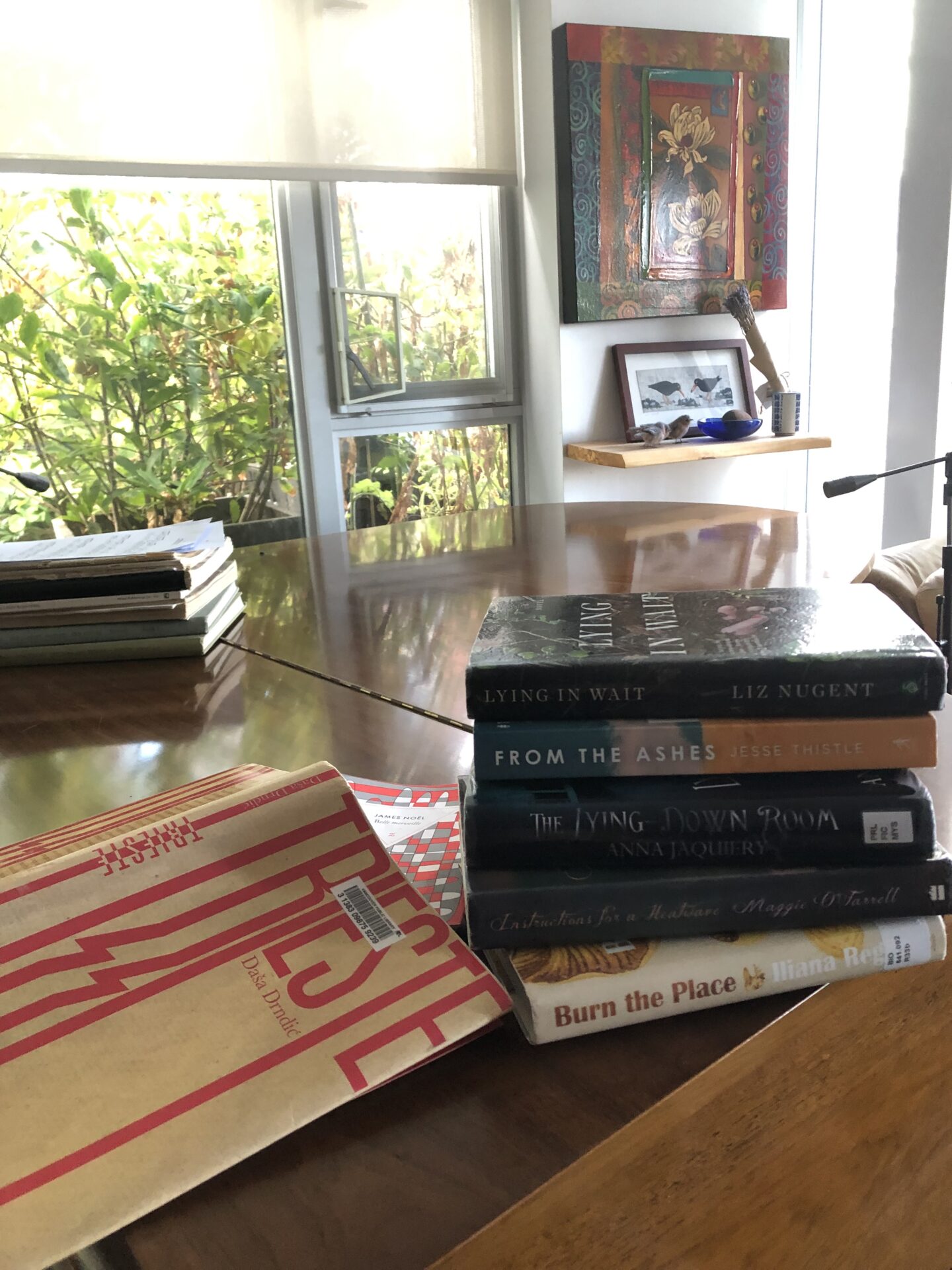
Before I share my notes about these, let me quickly tell you that a book I read in French a few years ago (scroll down to see italicized reference) and recommended to you — Alice Zeniter’s prize-winning L’art de Perdre — has now been translated by Frank Wynne and published in English as The Art of Losing. You really should read this; so good.
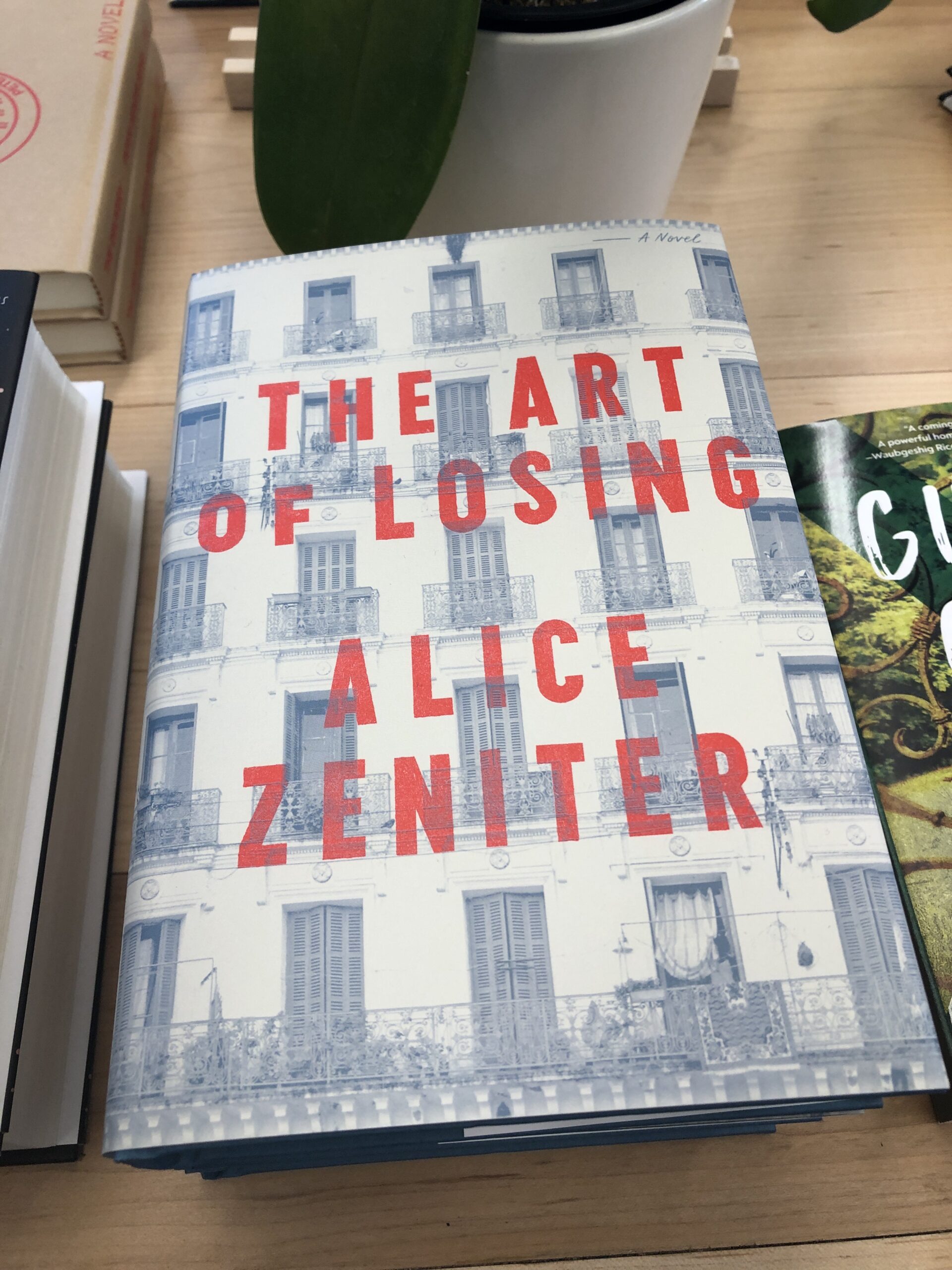
As well, I suspect some of you might be interested in a graphic novel about aging, a novel I haven’t yet read, but have put on my TBR list since reading this review by my friend Carol Matthews (whose memoir on “the bereavement phase” of her marriage I wrote about in this post). Normally, I’d wait until I’ve read a book myself before telling you about it, but I know the next few months will be busy and I don’t want forget to tell you about this one. I trust Carol’s reviews and I think many of us will find this book relevant — plus being open to new forms such as graphic novels is good, right?
Finally, now, my Reading Journal entries for September 2021. In deference to my busy, distracted focus on travel-planning, I’m just going to transcribe verbatim from my handwritten notes without adding the comments I sometimes make while posting.
63. Hold On, but Don’t Hold Still. Kristina Kuzmič. Memoir; Parenting; Single Parenting; Humour; Self-Help; American immigrant narrative; Croatian connection. Read as an E-book borrowed from VPL
I read this memoir because my friend (and regular reader, commenter, and occasional guest-blogger here) Dottoressa recommended it. Written by a 40+ mom, Croatian-American, who overcame a tough period as a single mom of two young kids to build, eventually, an online/social media presence with food / comedy / practical parenting and life wisdom show on YouTube. Not something I’d have picked up except for the Croatia connection, but it’s smart and funny and wise. Encouraging for parents of toddlers through teens.
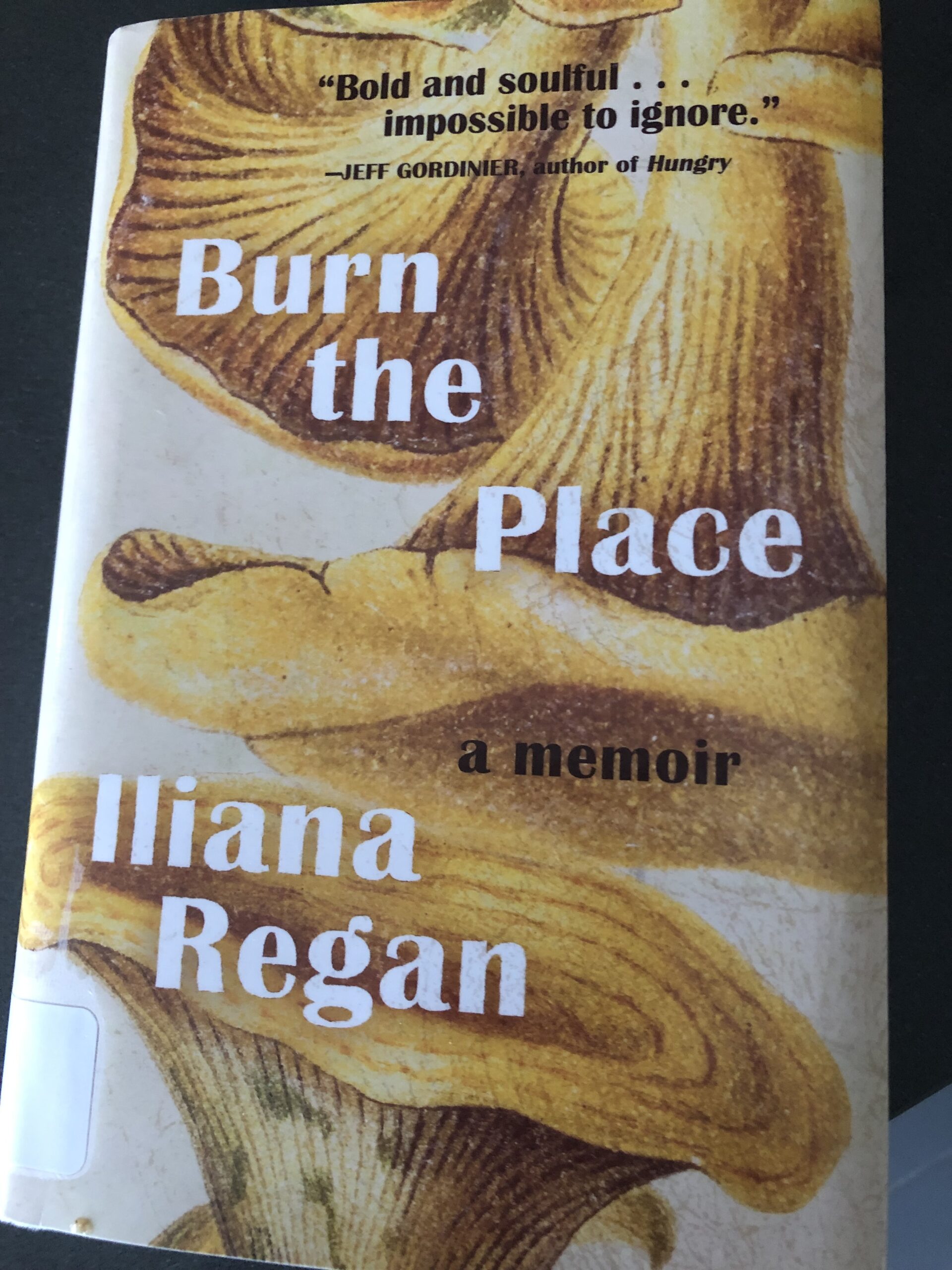
64. Burn the Place. Ilian Regan. Memoir; Coming-of-Age; Food; Regional food; Foraging; Female Chef; LGBTQ; Restaurant Culture. Borrowed hardcover from VPL
Memoir by female American chef who grew up as a girl longing to be a boy. The resulting pain and confusion — in a community not friendly to gender/sexuality diversity– drove or led her to alcoholism and substance addiction.
Saved eventually (so many setbacks!) by her love of cooking, of foraging from nature (developed/nurtured from a childhood on a farm near the woods in Indiana). Somehow she triumphs, persists in a dream of having her own restaurant (the Michelin-starred Elizabeth — oh, and she also has a Japanese-inspired pub, Kitsune, and a farm B&B, Milkweed Inn. Damned impressive!) in an industry inimical to women (never mind lesbians!). She’s vulnerable and fierce and courageously honest in telling her story, as she has been in her life.
Oh, and her writing is such that you won’t be surprised to know she has a BA in Creative Writing and an MFA.
Instagram post here. Otherwise, it seems I’ve been very bad at posting about books on IG lately. Reform is a faint possibility. . .
65. Instructions for a Heatwave. Maggie O’Farrell. Literary fiction; London; 1976 heat wave; family; marriage. Borrowed from VPL, hardcover
This title kept popping up across my social media this summer — likely triggered by our record-breaking temperatures and drought. I’m so glad I paid attention and put the book on hold at the library & finally got my copy this month.
The heatwave is England’s historic 1976 heatwave (also the context of Joanne Cannon’s The Trouble with Goats and Sheep (scroll down). A husband walks out to buy the paper, but doesn’t return. Greta, his wife of 30+ years, eventually calls her grown children and they gather despite their frustration/annoyance with their often overbearing mother and their resentments and rifts between siblings.
The youngest daughter, Aoife, even returns from the new life she’s trying to build in New York where she’s escaped from her family’s construction of her as a constant problem — and we gradually realize she is painfully dyslexic, diagnosed and known only by herself, the secret guarded at high cost. As we move toward the father/husband’s whereabouts, other secrets are revealed.
The full humanity of all the characters makes this a novel I wanted to sit with afterward. Dramatic enough, obviously, with the search and the revelations and the rifts and reconciliations . . . but also gentle and observant. I’m looking for her backlist now, this Maggie O’Farrell. And must read her latest, which many have recommended.
66. The Lying-Down Room. Anna Jaquiery. Mystery; Police procedural; Commandant Serge Morel series; Paris setting. Hardcover, borrowed from VPL
Can’t remember where I saw this recommended. Features Commandant Serge Morel (a Parisian of mixed descent — his deceased mother was Cambodian). Author lives in Australia, is of French-Malaysian descent.
Set in Paris — but no French at all in dialogues, etc. (which I found a bit odd, to be honest). I thought the prose took a few chapters to relax into itself — a bit too self-conscious until then, somehow.
Promising characters for continuing series — Commandant is typically dysfunctional in his personal/ family life (i.e. as so many fictional police detectives seem to be). He lives with his father (although in separate quarters in their large shared home) with whom he scarcely gets along; is having a longstanding affair with the younger wife of his father’s friend; is surreptitiously following (stalking can never really be benign, can it?) the love of his life with whom he broke off 15 years earlier.
The Russian connection (in the serial-killer narrative arc) is interesting and the link to childhood events, their lingering effects., etc.
I’ll try one more of this series — not quite convinced yet, but this was good enough that I’d give Jaquiery/Morel another look.
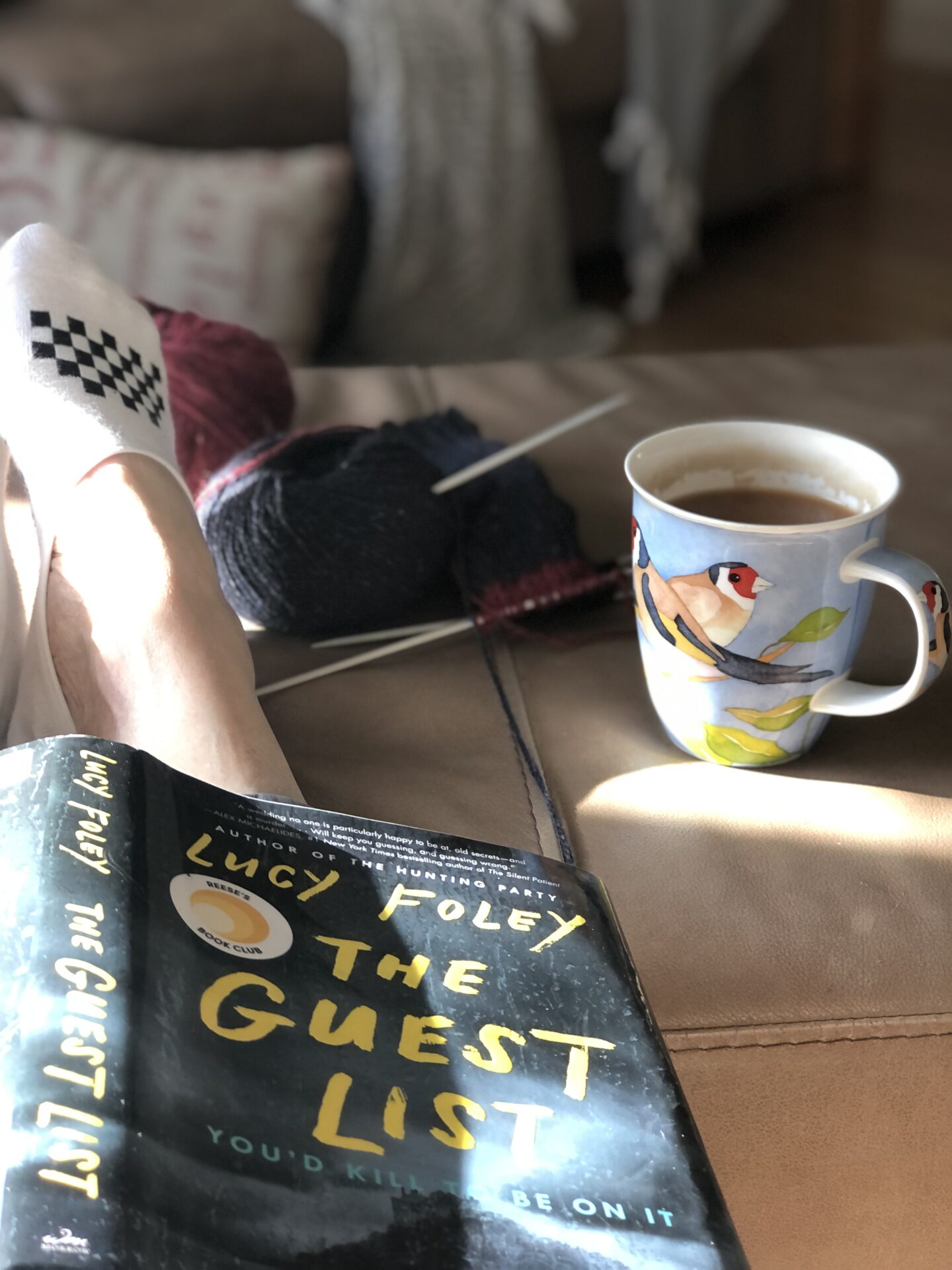
67. The Guest List, Lucy Foley. Mystery/Thriller; Comedy of Manners; Wedding drama; Ireland. Hardcover, borrowed as Fast Read from VPL
Set on a remote island off the coast of Ireland — a wedding of a striking and celebrated couple. A storm, a castle, a cemetery, a group of the groom’s friends who share secrets about a game they played in their boarding school days. Well-written page-turner, evocative, atmospheric setting.
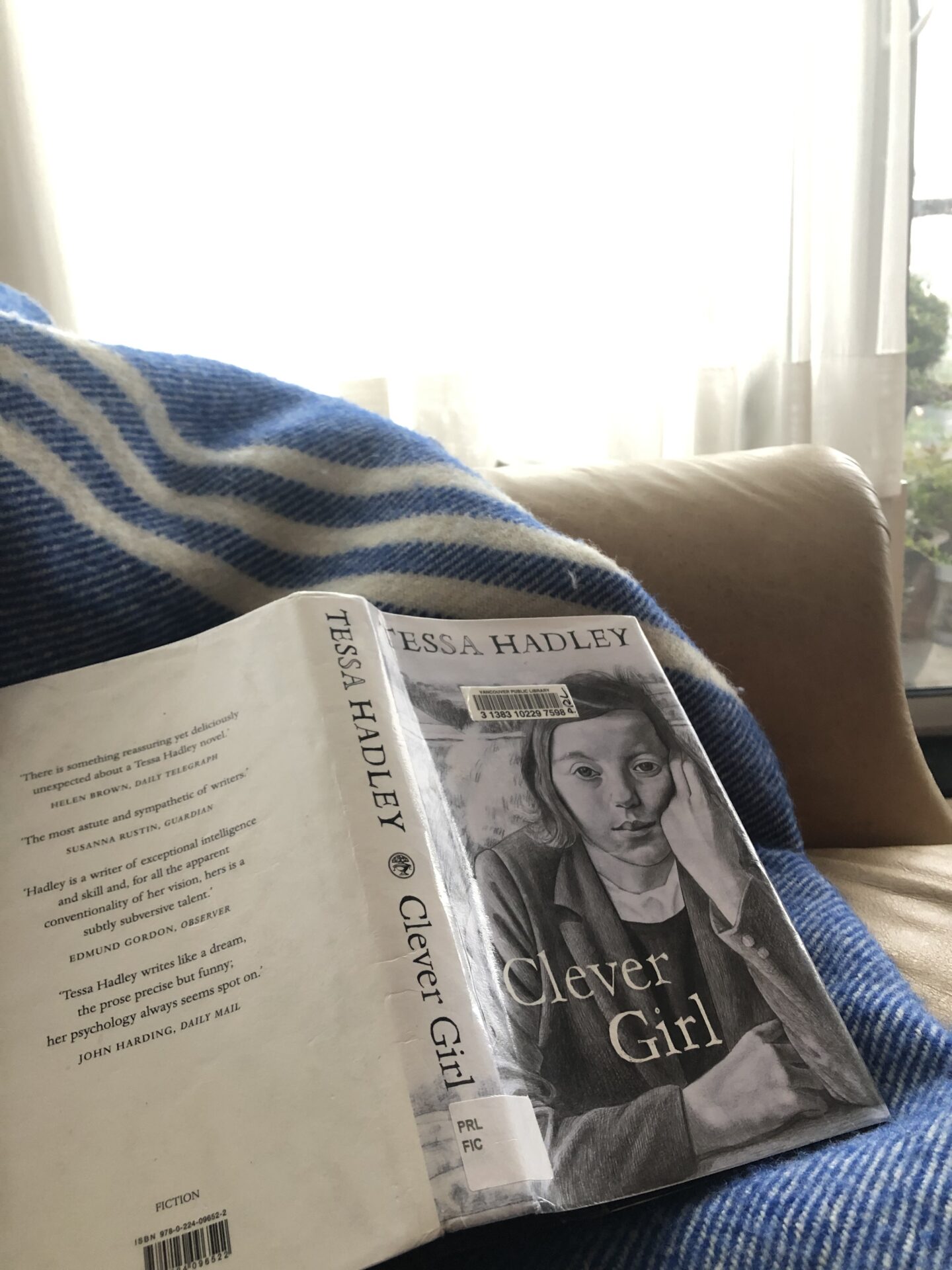
68. Clever Girl, Tessa Hadley. Literary fiction; coming-of-age novel; women’s lives; 60s/70s England (London, Bristol). Hardcover, borrowed from VPL
Stella is the “clever girl,” only daughter of a single working mom whose husband — Stella’s dad — supposedly died when Stella was young. She and her mother are quite close when she’s young, but that begins to change when her father’s sister comes to live with them after her son (a cousin Stella scarcely knew) is killed by his father.
Within a year, somehow both women have found new husbands . . . and Stella’s and her mother’s lives change significantly. With the new husband/stepfather, they move to a new home and Stella has to make new friends and adjust to her stepfather’s stricter rules and admonitions. And in the resulting years of rebellion, she becomes pregnant at 16, having only ever had sex twice . . . As she says, I wasn’t that clever, was I?”
How she manages, finds and builds a community, loves and loses tragically, raises two boys, completes an English Literature degree brilliantly but then abandons graduate work . . . all told in Hadley’s inimitably observant prose, light shone on small revealing moments.
69. From the Ashes. Jesse Thistle. Memoir; First Nations/Indigenous peoples/Métis; coming-of-age; substance abuse/addiction; Every Child Matters. Borrowed privately, trade paperback.
Moving memoir of the youngest of three Métis brothers essentially abandoned by their parents, taken into foster care, but then raised by loving grandparents who were also strict — and often exhausted with the challenged of raising their alcoholic, drug-addicted son’s children.
Jesse begins “acting out” in grade school — where he’s often target of racist taunts and where there’s rarely any support or protection by teachers. He does build a few friendships and in his teens is proud of having a job (arranged through his grandafther) but as he turns more regularly to alcohol and then to drugs, he loses his job, is kicked out by his grandparents and eventually alienates even his friends.
His descent is long and destructive — stints in jail, injuries from beatings and from falls incurred in escaping police, etc. So prolonged and so absolute the destructive path that it seems impossible he will ever recover. The narrative is honest and moving and ugly and ultimately redemptive and hopeful and even beautiful . . . as Thistle writes from his current position as PhD academic in a solid, loving relationship.
70. Trieste, Daša Drndić. Trans. Ellen Elias-Bursać. Documentary fiction; European history; Holocaust; Trieste; Croatian writer;
“Documentary fiction,” a sobering novel by a recently deceased Croatian writer.
Begins by tracing history of Trieste, the way its name changes with the shifting borders of history — different nationalities, loyalties, languages, cultures in its strategic location at intersection of many powers. Narrator omniscient, distanced, ironic, shifting point-of-view.
An old woman — Haya Tedeschi — from town of Gorizia (near Trieste) — sits with a basket of artifacts, files, photos, letters, articles. She’s searching, it turns out, for the son who was stolen from her as a baby, the son whose father was an SS officer.
The novel traces Haya’s history from before the war and since. Her role as a victim but also as complicit. The personal representative of so many stories. Each name (at one point in the novel, there are 40 pages listing names of Jews deported and killed) a story.
In the last section of the novel, the narration switches to Haya’s son, his own search accompanied by others also horrified by what they’ve found about their own parentage.
One reviewer compared the novel to Sebald’s writing. Personally, I found it more bitter, less . . . oneiric?
Difficult, so difficult to read. But important, I think, especially given what the narrator says about our collective desire or willingness to allow the memories to be hidden, to subside, for continuities to re-assert themselves. And I think of the current “shock and surprise, etc.” here in Canada over the missing First Nations children, the bodies unearthed from unmarked graves at residential schools. How long will our outrage last? How long will we call for memorialization? How long will we be willing to listen, to witness, to read difficult accounts? And given how many have known about this for decades already, why did it take so long for the “dominant society” to pay attention?
That’s it, that’s what I managed to read in September, although I realize now that I forgot one book (Liz Nugent’s Lying in Wait, a taut page-turner of a mystery/domestic thriller). . . which I picked up at the end of September as a break from Trieste — which I actually finished in early October. But this editor is going to respond to that potential correction with “Stet.” Let it stand, my error of distraction. I have understanding readers, right?
And I will be waiting for a conversation to begin with you, understanding readers. . . Which of these titles have you read or had recommended already? Which titles appeal (and perhaps which appal)? What are you reading or what books have you enjoyed (or not) recently? Any comments, really, that this post brings to mind: I just enjoy our book chats, so the mic is now yours.
xo,
f
Thanks, Frances, for the kind mention and for the good suggestions for new books. I think you are the only person I know who reads as much as I do — or maybe you read more! In any case, I think we share an
addiction — nd it’s not the worst kind of addiction.
I look forward to reading The Art of Losing, and some of the others, and talking to you about them.
Happy travels.
Carol
Author
You’re very welcome, Carol — I hope to pick up a copy of Hiromi Goto’s graphic novel when we get back home. I look forward to one of our long and satisfying book conversations after that. Definitely an addiction, though, but not such a bad one.
Happy and safe travels. Just requested The Art of Losing from our library. Our SIL is Algerian, so very interested in reading more about this country and families in exile.
Author
Thanks for the travel wishes. I hope you enjoy The Art of Losing as much as I did. Much about France’s colonial history still needs to be reconciled.
Just added my name to the holds list for The Art of Losing and I’m third on the list. Have a wonderful trip!
Author
I’ll look forward to hearing what you think about it. Third on the list is not too long a wait. And thank you, I’m really excited about seeing our kids again, and the stop in Paris will be the cherry on the cake 😉
Thank you for mentioning me
I like K. Kuzmic book and her older videos,the temporary not so much
The Guest List was the first book I’ve listened to as audio book,liked it very much indeed
I’ve read City of Girls- remember your review. E. Gilbert is such a strange author,I’ve read three of her books,everyone of them is like writed from another writer. Though,I like the City…
Sarah Blake’s The Guest Book ,story about family,life of priviledge and pain….and an island,that is a character itself,about grief and silence,a lot of unspoken….I’ve enjoyed reading it
Chris Whitaker’s We Begin at the End, I’m reading right now, award- winning novel – is a thriller that’s not exactly the thriller,crime drama about people who’ve lost a lot,life serving them less (or maybe more….pain,troubles,ilnesses,addiction…)than they deserved.
So far,very good,poignant life stories,I expect some surprises,but not a happy end….we’ll see
Dottoressa
Author
So true about E. Gilbert’s writing. The two novels (City of Girls and The Signature of All Things) surprised me in being as good as they are; I had mixed feelings about Eat, Pray, Love. And I tried to read Big Magic but didn’t finish — content seemed sufficient to fill a magazine essay, but swollen into a book.
Hamnet by Maggie O’Farrell is one of the best books I read this year. Also, I highly recommend the Wolf Hall trilogy by Hilary Mantel. Each book is absolutely absorbing and so well written.
Author
I’m getting impatient to read Hamnet, having heard it recommended often. And I concur wholeheartedly with your recommendation of the Wolf Hall trilogy (although the last didn’t work as well for me as the first two). Mantel’s A Place of Greater Safety is also very good (about the French Revolution).
Pre trip paperwork sounds awful at the moment . I’ve a friend visiting her son in Luxembourg soon & she’s tattered with the forms etc . She’s only going for a few days so I said to make sure not to fall out with him whilst she’s there or it really won’t be worth all that work ! I have read the Lucy Foley book & I enjoyed the atmosphere of the island but felt the ending was weak . I like Maggie O’Farrell but am loving Mary Lawson’s books .
Author
Ha! Making a quick note to self: Do not fall out with the Rome crew! 😉
For me, the pre-trip preparations are not only cumbersome for finding and downloading and printing, etc. all the forms, but also for the anxiety — trying to read through lists of categories to be sure about what’s required for vaccinated travellers from such-and-such country going to such-and-such country if, if, and if. And then we won’t be able to get on our flight home if we don’t achieve a negative test within the last 72 hours. So . . . Gulp!
I wouldn’t argue about the end of The Guest List, but enjoyed it nonetheless and found the ending okay.
It’s so long since I’ve read Crow Lake — which I liked very much. Hmmm, perhaps I’ll download a few Lawson titles for my travel, bring some Canada along with me.
I’m so happy for you regarding your upcoming travels and look forward to whatever you’re able to share from Europe. Thank you as always for the reading list, which I always appreciate. I don’t read as many books as you do and have struggled recently to find books I enjoy – many are discarded because I don’t find them engaging. This was not something that happened when I was younger. Perhaps it’s due to a shortened attention span caused by too much screen time…
Your reading list contains three books that allude to fire in their title. A coincidence I’m sure but I wondered if your choices were subtly influenced by your very warm summer.
Author
I think we do all have shortened attention spans thanks to the time we spend watching and clicking. Have you ever read Nicholas Carr’s book (or even just the essay it started from), The Shallows: What the Internet Is Doing to our Brains. Dated now (at 11 years old!!), but really interesting — and ultimately hopeful thanks to neuro-plasticity.
So interesting what you point out about those three titles!! Thanks for spotting that!
Always glad to have book recommendations Frances. There are a few I will adds to my list. You had recommended Monogamy by Sue Miller last month, along with some other readers and I really liked it. recently read Anxious People by Swedish author Fredric Backman, so well observed and I found quite funny. a favorite writer of mine in Alexander McCall Smith. I happened to see a book of short stories he wrote each based on vintage photos. Now reading Circe, by Madeline Miller for a book club. Kind of a coincidence as my lecture series is focusing on Greece this Semester, history, philosophy and film.
Author
Wasn’t Monogamy good? Haven’t read any Fredric Backman but duly noted, thanks. I really enjoyed Circe — I would probably have enjoyed it even more if I’d been doing a lecture series such as yours when I read it — and you’re lucky to have a book club to discuss it with — enjoy!
I am so grateful for you, your wisdom, and your books! I could use a bit more about your knitting, if you’ve got time.
Author
Thanks you so much for the kind words, Kate. Much appreciated. And I will try to remember to include more knitting news, although my big focus this year has been socks and little animals 😉 I’ve got a sweater on the go now. Maybe I’ll try to do a knitting post when I get back.
Oh, such exciting reading. I have read The Guest List and enjoyed it, although everyone else in the book group I read it for hated it. We were supposed to read The Guest Book by Sarah Blake, which Dottoressa mentioned, and I had mixed feelings about that. We are discussing it next month, so it will turn up on my blog eventually. On your list I have added The Art of Losing and Instructions for a Heatwave to my list. I am soon to read another novel by Maggie O’Farrell, Hamnet, much discussed lately, for my second book group. I will probably drop the first group, as the reading tends toward historical romances which frustrate me more than excite me, eventually, but keep the second one. What luxury, to have a choice.
How exciting to be traveling. It all sounds too exhausting to me at the moment. But that will turn around.
Author
Wow! Hate seems really strong for The Guest List, doesn’t it?
You will really like (be moved by?) The Art of Losing and Instructions for a Heatwave. I really need to read Hamnet!!
You’re very lucky to have a choice of book clubs (but I’m not usually drawn tow historical romances, either, although back in high school I read many, many Georgette Heyer books! 😉
As for the travel, it is exciting but oh, so much adrenaline and we haven’t even headed for the airport yet. You’re wise to wait until it (oh, I hope, I hope) becomes a bit easier again.